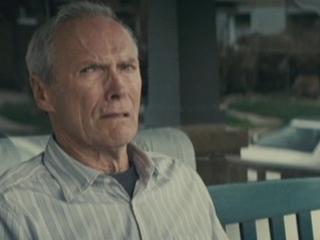
Directed by: Clint Eastwood
Starring: Clint Eastwood, Chris Carley, John Carroll Lynch, Bee Vang, Ahney Her
The icon Clint Eastwood has evolved from The Man with No Name to Curmudgeon with a Heart of Gold in one stellar film career. Few actors have transitioned so successfully into directing as Eastwood has. He can convey more in a squint or a growl than many actors can with all of their Actors' Studio training at their disposal. Gran Torino was Eastwood's first onscreen appearance since his Oscar-winning Million Dollar Baby (2004) and, of course, he is a treasure. The film itself is uneven and over-the-top in its depiction of a bigoted curmudgeon gone good. The moments, including the ending, which are supposed to be powerful are instead curiously muted.
Eastwood is Walt Kowalski, a widower whose wife recently passed and spends his days in retirement working on his beloved 1972 Gran Torino or fixing things around the house. A Korean War vet, he is perturbed when a Hmong family from Laos moves in next door and even more perturbed when one of its members attempts to steal his Gran Torino. The teen, named Thao (Vang), was coerced by his gang member cousin into trying to steal the car. Walt, calling the young man "gook" and "zipperhead", doesn't turn Thao into the cops, but instead forces him to help him around the house with odd jobs. Thao, who is generally a nice kid, reluctantly complies, but soon the two forge an unlikely friendship, which extends to Thao's family. And wouldn't you know it? The family's grandmother is as bigoted against Walt as a white man as Walt is against the Laotians, which is played for laughs as the tables are turned on Walt.
Walt surely spouts racial slurs and growls at Thao like a dog suffering from a cavity, but we know he will gradually soften and grow to love his new adoptive Hmong family. Why? Because we've seen something like this in Million Dollar Baby. And we will see again in Trouble with the Curve (2012), which I enjoyed better than Gran Torino, probably because Eastwood was surely cantankerous, but lovable as an aging baseball scout trying to hang on to his job in a changing job environment.
Gran Torino's story arc is predictable, which isn't in and of itself fatal, but the changes Walt goes through don't carry the emotional weight we expect. And the choices he makes at the film's climax would be more formidable if he weren't coughing up blood occasionally, a sure sign he doesn't have long to live. I think Walt's changes may have been more meaningful, if, like in Million Dollar Baby, they didn't feel hedged by the health concerns. Instead, we are left to wonder if he truly would have done what he did if he weren't ill.
And like Million Dollar Baby, Walt is in verbal combat with (and then reconciles with) a local priest who promised his deceased wife that he would check in on Walt every now and again. When the priest learns of what happens to Thao's sister and Walt's plot for revenge, he tries to talk Walt out of it to no avail, and mostly for spiritual reasons. I am certain the thematic similarities between the two films wasn't lost on Eastwood, who is among the most intelligent of directors.
Gran Torino is a near miss for me, a bit of a comedown from his previous films which established him as not just a Hollywood icon, but a master filmmaker. As usual, Eastwood directs with linear precision and without wasted motion, but somehow the heart is missing, which is highly unusual for an Eastwood film.
No comments:
Post a Comment